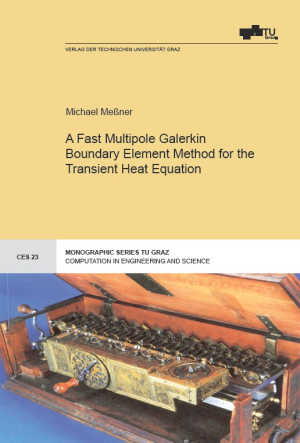Transient heat transfer plays a major role in many physical and chemical processes, which implies the need for efficient numerical simulation tools in a wide range of engineering fields, such as mechanical, chemical and process engineering. Our aim is to develop a stable, robust, and efficient boundary element algorithm to solve problems arising from applications in those disciplines. It is a well known fact that uniqueness, solvability, and quasi-optimality of space-time Galerkin boundary element methods follows from the boundedness and ellipticity of the thermal single layer- and hyper-singular operator. To handle the arising dense matrix problems we accelerate our solver via the parabolic fast multipole method and thus obtain almost optimal complexity in the number of unknowns. Since the heat kernel is smooth for positive time and exponentially decaying in space, we approximate the kernel by a multivariate Lagrange-Chebyshev interpolation for well separated space-time clusters, which enables an efficient evaluation of their contributions to the thermal layer potentials. Finally, we investigate some benchmark problems to show that the error, induced by the fast multipole method, can be controlled and does not destroy the convergence rates of the Galerkin scheme. Furthermore, we simulate some problems from industrial applications to show the suitability of the proposed method for large scale problems.
Ausgabe: Open Access E-Book
ISBN: 978-3-85125-351-1
Erschienen: Juni 2014
Reihe: Monographic Series TU Graz / Computation in Engineering and Science, Band 23
Transient heat transfer plays a major role in many physical and chemical processes, which implies the need for efficient numerical simulation tools in a wide range of engineering fields, such as mechanical, chemical and process engineering. Our aim is to develop a stable, robust, and efficient boundary element algorithm to solve problems arising from applications in those disciplines. It is a well known fact that uniqueness, solvability, and quasi-optimality of space-time Galerkin boundary element methods follows from the boundedness and ellipticity of the thermal single layer- and hyper-singular operator. To handle the arising dense matrix problems we accelerate our solver via the parabolic fast multipole method and thus obtain almost optimal complexity in the number of unknowns. Since the heat kernel is smooth for positive time and exponentially decaying in space, we approximate the kernel by a multivariate Lagrange-Chebyshev interpolation for well separated space-time clusters, which enables an efficient evaluation of their contributions to the thermal layer potentials. Finally, we investigate some benchmark problems to show that the error, induced by the fast multipole method, can be controlled and does not destroy the convergence rates of the Galerkin scheme. Furthermore, we simulate some problems from industrial applications to show the suitability of the proposed method for large scale problems.
Das könnte Sie auch interessieren
- Gesamtverzeichnis
- Neuerscheinungen
-
Open-Access-Publikationen

- Multimediale E-Books
-
Reihen
- Akademische Reden an der Technischen Universität Graz
- Arbeitshilfen für die Praxis
- Archiv und Bibliothek
- Betonkolloquium
- Buddhist Architecture in the Western Himalayas
- BWL Schriftenreihe
- Electrical Power Systems
- Fachbücher Planung und Bau
- Facts & Figures
- Festschriften TU Graz
- Forschungsreihe IBBW
- Forum Technik und Gesellschaft
- Geodesy
- Immersive Learning Research Network Conference; Workshop, short papers, poster
- Institut für Gebäudelehre Jahrbuch
- International Brain-Computer Interface (BCI) Meeting
- LM.VM.2014
- Logistik Werkstatt Graz
- Materialien zu Schwerpunkten am Institut für Gebäudelehre
- Mathematical Modelling of Weld Phenomena
- Monographic Series TU Graz
- Monographic Series TU Graz|Advanced Materials Science
- Monographic Series TU Graz|Computation in Engineering and Science
- Monographic Series TU Graz|Production Science and Management
- Monographic Series TU Graz|Railway Research
- Monographic Series TU Graz|Reihe Fahrzeugtechnik
- Monographic Series TU Graz|Schriftenreihe des Instituts Betonbau
- Monographic Series TU Graz|Structural Analysis
- Monographic Series TU Graz|Techno- und sozioökonomisch orientierte Betriebswirtschaft
- Monographic Series TU Graz|Technoökonomie und industrielles Management
- Monographic Series TU Graz|Timber Engineering & Technology
- November Talks
- Proceedings of the International Brain-Computer Interface
- Schriftenreihe des Instituts für Baubetrieb und Bauwirtschaft
- Schriftenreihe des Instituts für Straßen- und Verkehrswesen
- Schriftenreihe des Instituts für Wohnbau der TU Graz
- Schriftenreihe zur Wasserwirtschaft
- Science, Technology and Society online
- Seminarreihe Bauunternehmensführung
- Studien zur Architektur | TU Graz
- Textbook Series
- Transform Industry: Guiding the transformation of SMEs
- TU Graz Jahresbericht | Annual report
- TU Graz people
- TU Graz Research
- VKM-THD Mitteilungen; IVT-Mitteilungen ab Bd. 100
- Publizierende von A-Z
- Angebote
Kontakt
Verlag der
Technischen Universität Graz
Technikerstraße 4
8010 Graz, Österreich
UID(VAT) ATU 57477929
Kontaktperson
Gabriele Groß
Tel.: +43(0)316 873 6157
E-Mail: verlag [ at ] tugraz.at
Datenschutzübersicht
Notwendige Cookies sind für die ordnungsgemäße Funktion der Website unbedingt erforderlich. Diese Cookies stellen anonym grundlegende Funktionen und Sicherheitsfunktionen der Website sicher.
| Cookie | Dauer | Beschreibung |
|---|---|---|
| cookielawinfo-checkbox-analytics | 11 Monate | Dieses Cookie wird vom GDPR Cookie Consent Plugin gesetzt. Das Cookie wird verwendet, um die Zustimmung des Benutzers für die Cookies in der Kategorie „Analytics“ zu speichern. |
| cookielawinfo-checkbox-functional | 11 Monate | Das Cookie wird durch die DSGVO-Cookie-Zustimmung gesetzt, um die Zustimmung des Benutzers für die Cookies in der Kategorie "Funktional" zu erfassen. |
| cookielawinfo-checkbox-necessary | 11 Monate | Dieses Cookie wird vom GDPR Cookie Consent Plugin gesetzt. Die Cookies werden verwendet, um die Zustimmung des Benutzers für die Cookies in der Kategorie „Notwendig“ zu speichern. |
| qtrans_front_language | 1 Jahr | Dieses Cookie wird vom qTranslate WordPress-Plugin gesetzt. Das Cookie wird verwendet, um die bevorzugte Sprache des Besuchers zu verwalten. |
| viewed_cookie_policy | 11 Monate | Das Cookie wird vom Plugin GDPR Cookie Consent gesetzt und wird verwendet, um zu speichern, ob der Benutzer der Verwendung von Cookies zugestimmt hat oder nicht. Es werden keine personenbezogenen Daten gespeichert. |
| woocommerce_cart_hash | session | Dieses Cookie wird von WooCommerce gesetzt. Das Cookie hilft WooCommerce dabei, festzustellen, wann sich der Inhalt/die Daten des Warenkorbs ändert. |
Analyse-Cookies werden verwendet, um zu verstehen, wie Besucher mit der Website interagieren. Diese Cookies helfen dabei, Informationen zu Metriken wie Anzahl der Besucher, Absprungrate, Verkehrsquelle usw. bereitzustellen.
| Cookie | Dauer | Beschreibung |
|---|---|---|
| _pk_id | 1 Jahr 27 Tage | Erforderlich für den Betrieb von Matomo, einem Analysetool, das das Nutzerverhalten verfolgt und analysiert. |
| _pk_ref | 13 Monate | Erforderlich für den Betrieb von Matomo, einem Analysetool, das das Nutzerverhalten verfolgt und analysiert. |
| _pk_ses | 30 Minuten | Erforderlich für den Betrieb von Matomo, einem Analysetool, das das Nutzerverhalten verfolgt und analysiert. |
Andere nicht kategorisierte Cookies sind diejenigen, die analysiert werden und noch nicht in eine Kategorie eingeordnet wurden.
| Cookie | Dauer | Beschreibung |
|---|---|---|
| yt-remote-connected-devices | niemals | Speichert die Benutzereinstellungen beim Abruf eines auf anderen Webseiten integrierten Youtube-Videos |
| yt-remote-device-id | niemals | Speichert die Benutzereinstellungen beim Abruf eines auf anderen Webseiten integrierten Youtube-Videos |







